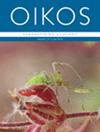Special issue.: The role of whole genome duplication in evolutionary ecology
IF 3
2区 环境科学与生态学
Q2 ECOLOGY
引用次数: 0
Abstract
Polyploid organisms are common and can be found across the tree of life. A key question is to understand how and why these polyploid lineages become established and persist in populations, particularly since they are predicted to have a low probability of success. While the collection of papers in this special issue addresses broad questions on the evolutionary ecology of polyploids, ultimately, these studies also highlight the myriad ways that we are examining what drives the success of polyploid lineages. In this paper we consider where we've been and the challenges that we face, and then propose several directions that will allow us to continue to propel the field towards our ultimate goal of understanding the rules that govern the establishment and persistence of polyploid populations. We conclude that developing this rule set will require a combination of model systems for which we have detailed knowledge of the phylogenetic and population genetic history, expanding our perspective beyond plants to include greater taxonomic breadth, and conducting studies in ecologically relevant settings. Additionally, we argue that future research on the evolutionary ecology of polyploidy should focus on integrating theory and empirical research, providing mechanistic linkages between the effects of whole genome duplication and population demography, and build a predictive framework to understand how anthropogenic change will impact polyploid organisms.特刊全基因组复制在进化生态学中的作用
多倍体生物很常见,在生命树上随处可见。一个关键问题是要了解这些多倍体系是如何以及为何在种群中建立并持续存在的,尤其是因为它们被认为成功的概率很低。本特刊中的论文集探讨了多倍体进化生态学的广泛问题,但最终,这些研究也凸显了我们正在研究驱动多倍体系成功的无数方法。在本文中,我们将探讨我们所走过的道路和面临的挑战,然后提出几个方向,让我们能够继续推动这一领域实现我们的最终目标,即了解多倍体种群建立和持续存在的规则。我们的结论是,要制定这套规则,需要结合我们对其系统发育和种群遗传历史有详细了解的模型系统,将我们的视角从植物扩展到更广阔的分类学领域,并在生态相关的环境中开展研究。此外,我们还认为,未来有关多倍体进化生态学的研究应注重理论与实证研究的结合,提供全基因组复制效应与种群数量之间的机理联系,并建立一个预测框架,以了解人为变化将如何影响多倍体生物。
本文章由计算机程序翻译,如有差异,请以英文原文为准。
求助全文
约1分钟内获得全文
求助全文
来源期刊

Oikos
环境科学-生态学
CiteScore
6.20
自引率
5.90%
发文量
152
审稿时长
6-12 weeks
期刊介绍:
Oikos publishes original and innovative research on all aspects of ecology, defined as organism-environment interactions at various spatiotemporal scales, so including macroecology and evolutionary ecology. Emphasis is on theoretical and empirical work aimed at generalization and synthesis across taxa, systems and ecological disciplines. Papers can contribute to new developments in ecology by reporting novel theory or critical empirical results, and "synthesis" can include developing new theory, tests of general hypotheses, or bringing together established or emerging areas of ecology. Confirming or extending the established literature, by for example showing results that are novel for a new taxon, or purely applied research, is given low priority.
 求助内容:
求助内容: 应助结果提醒方式:
应助结果提醒方式:


